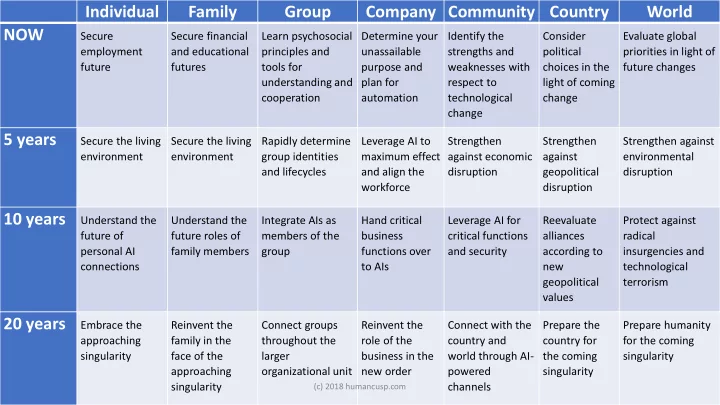

Individual Family Group Company Community Country World NOW Secure Secure financial Learn psychosocial Determine your Identify the Consider Evaluate global employment and educational principles and unassailable strengths and political priorities in light of future futures tools for purpose and weaknesses with choices in the future changes understanding and plan for respect to light of coming cooperation automation technological change change 5 years Secure the living Secure the living Rapidly determine Leverage AI to Strengthen Strengthen Strengthen against environment environment group identities maximum effect against economic against environmental and lifecycles and align the disruption geopolitical disruption workforce disruption 10 years Understand the Understand the Integrate AIs as Hand critical Leverage AI for Reevaluate Protect against future of future roles of members of the business critical functions alliances radical personal AI family members group functions over and security according to insurgencies and connections to AIs new technological geopolitical terrorism values 20 years Embrace the Reinvent the Connect groups Reinvent the Connect with the Prepare the Prepare humanity approaching family in the throughout the role of the country and country for for the coming singularity face of the larger business in the world through AI- the coming singularity approaching organizational unit new order powered singularity singularity channels (c) 2018 humancusp.com
Asilomar Principles – Research Issues 1. Research Goal: The goal of AI research should be to create not undirected intelligence, but beneficial intelligence. 2. Research Funding: Investments in AI should be accompanied by funding for research on ensuring its beneficial use, including thorny questions in computer science, economics, law, ethics, and social studies, such as: a) How can we make future AI systems highly robust, so that they do what we want without malfunctioning or getting hacked? b) How can we grow our prosperity through automation while maintaining people’s resources and purpose? c) How can we update our legal systems to be more fair and efficient, to keep pace with AI, and to manage the risks associated with AI? d) What set of values should AI be aligned with, and what legal and ethical status should it have?
Asilomar Principles – Research Issues (cont’d) 3. Science-Policy Link: There should be constructive and healthy exchange between AI researchers and policy-makers. 4. Research Culture: A culture of cooperation, trust, and transparency should be fostered among researchers and developers of AI. 5. Race Avoidance: Teams developing AI systems should actively cooperate to avoid corner-cutting on safety standards.
Asilomar Principles – Ethics and Values 6. Safety: AI systems should be safe and secure throughout their operational lifetime, and verifiably so where applicable and feasible. 7. Failure Transparency: If an AI system causes harm, it should be possible to ascertain why. 8. Judicial Transparency: Any involvement by an autonomous system in judicial decision-making should provide a satisfactory explanation auditable by a competent human authority. 9. Responsibility: Designers and builders of advanced AI systems are stakeholders in the moral implications of their use, misuse, and actions, with a responsibility and opportunity to shape those implications. 10. Value Alignment: Highly autonomous AI systems should be designed so that their goals and behaviors can be assured to align with human values throughout their operation. 11. Human Values: AI systems should be designed and operated so as to be compatible with ideals of human dignity, rights, freedoms, and cultural diversity.
Asilomar Principles – Ethics and Values (cont’d) 12. Personal Privacy: People should have the right to access, manage and control the data they generate, given AI systems’ power to analyze and utilize that data. 13. Liberty and Privacy: The application of AI to personal data must not unreasonably curtail people’s real or perceived liberty. 14. Shared Benefit: AI technologies should benefit and empower as many people as possible. 15. Shared Prosperity: The economic prosperity created by AI should be shared broadly, to benefit all of humanity. 16. Human Control: Humans should choose how and whether to delegate decisions to AI systems, to accomplish human-chosen objectives. 17. Non-subversion: The power conferred by control of highly advanced AI systems should respect and improve, rather than subvert, the social and civic processes on which the health of society depends. 18. AI Arms Race: An arms race in lethal autonomous weapons should be avoided.
Asilomar Principles – Longer-Term Issues 19. Capability Caution: There being no consensus, we should avoid strong assumptions regarding upper limits on future AI capabilities. 20. Importance: Advanced AI could represent a profound change in the history of life on Earth, and should be planned for and managed with commensurate care and resources. 21. Risks: Risks posed by AI systems, especially catastrophic or existential risks, must be subject to planning and mitigation efforts commensurate with their expected impact. 22. Recursive Self-Improvement: AI systems designed to recursively self-improve or self-replicate in a manner that could lead to rapidly increasing quality or quantity must be subject to strict safety and control measures. 23. Common Good: Superintelligence should only be developed in the service of widely shared ethical ideals, and for the benefit of all humanity rather than one state or organization.
Recommend
More recommend